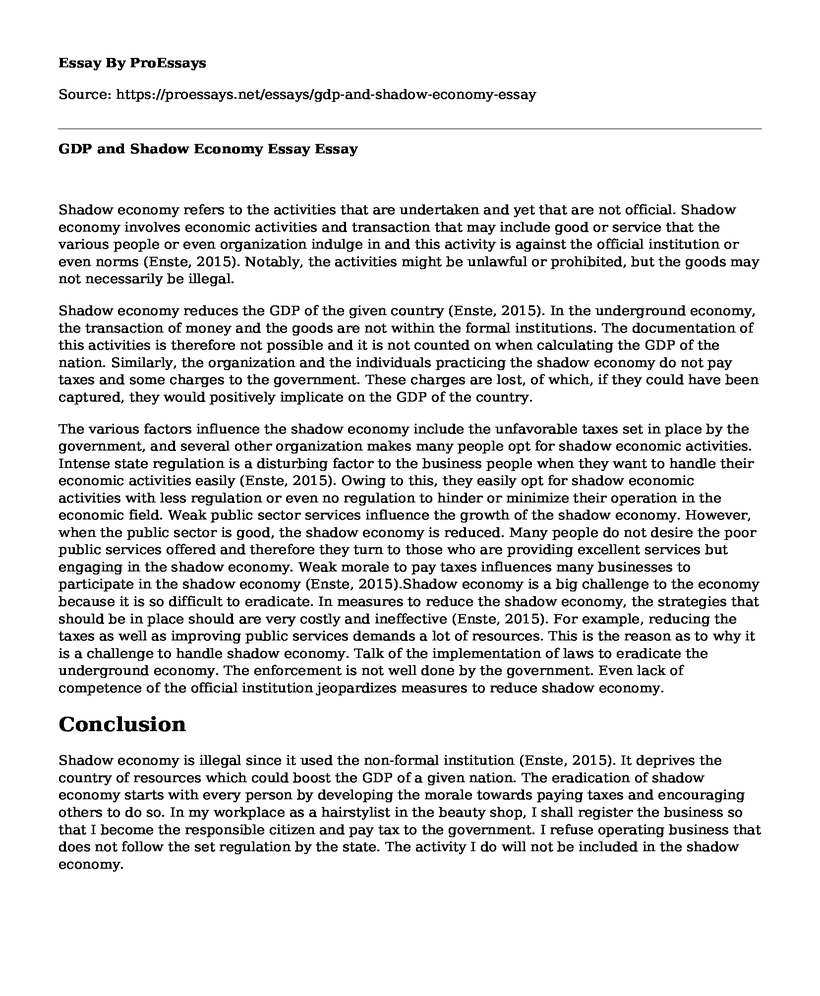Shadow economy refers to the activities that are undertaken and yet that are not official. Shadow economy involves economic activities and transaction that may include good or service that the various people or even organization indulge in and this activity is against the official institution or even norms (Enste, 2015). Notably, the activities might be unlawful or prohibited, but the goods may not necessarily be illegal.
Shadow economy reduces the GDP of the given country (Enste, 2015). In the underground economy, the transaction of money and the goods are not within the formal institutions. The documentation of this activities is therefore not possible and it is not counted on when calculating the GDP of the nation. Similarly, the organization and the individuals practicing the shadow economy do not pay taxes and some charges to the government. These charges are lost, of which, if they could have been captured, they would positively implicate on the GDP of the country.
The various factors influence the shadow economy include the unfavorable taxes set in place by the government, and several other organization makes many people opt for shadow economic activities. Intense state regulation is a disturbing factor to the business people when they want to handle their economic activities easily (Enste, 2015). Owing to this, they easily opt for shadow economic activities with less regulation or even no regulation to hinder or minimize their operation in the economic field. Weak public sector services influence the growth of the shadow economy. However, when the public sector is good, the shadow economy is reduced. Many people do not desire the poor public services offered and therefore they turn to those who are providing excellent services but engaging in the shadow economy. Weak morale to pay taxes influences many businesses to participate in the shadow economy (Enste, 2015).Shadow economy is a big challenge to the economy because it is so difficult to eradicate. In measures to reduce the shadow economy, the strategies that should be in place should are very costly and ineffective (Enste, 2015). For example, reducing the taxes as well as improving public services demands a lot of resources. This is the reason as to why it is a challenge to handle shadow economy. Talk of the implementation of laws to eradicate the underground economy. The enforcement is not well done by the government. Even lack of competence of the official institution jeopardizes measures to reduce shadow economy.
Conclusion
Shadow economy is illegal since it used the non-formal institution (Enste, 2015). It deprives the country of resources which could boost the GDP of a given nation. The eradication of shadow economy starts with every person by developing the morale towards paying taxes and encouraging others to do so. In my workplace as a hairstylist in the beauty shop, I shall register the business so that I become the responsible citizen and pay tax to the government. I refuse operating business that does not follow the set regulation by the state. The activity I do will not be included in the shadow economy.
Reference
Enste, D. (2015). The shadow economy in industrial countries. IZA World Of Labor. doi: 10.15185/izawol.127
Cite this page
GDP and Shadow Economy Essay. (2022, Jul 25). Retrieved from https://proessays.net/essays/gdp-and-shadow-economy-essay
If you are the original author of this essay and no longer wish to have it published on the ProEssays website, please click below to request its removal:
- Research Paper on Globalization and Populism
- Capitalism Versus Communism: The United States Versus the Soviet Union in the Cold War Years
- Essay on Empowerment Impact: Employee Performance & Organizational Outcomes
- Safety Culture: Mediating BIM & Construction Site Safety - Essay Sample
- Essay Example on OSHA Compliance: Investigating Employee Complaints
- Unions: Negotiating From Strength for Employee Benefits - Essay Sample
- The Negative Impact of Technology: Unemployment, Laziness, Environmental Issues, and Health Concerns







